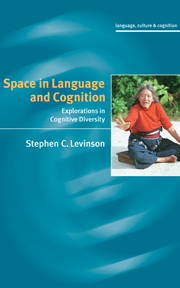Book contents
- Frontmatter
- Contents
- List of figures
- List of tables
- Preface
- Acknowledgements
- 1 The intellectual background: two millennia of Western ideas about spatial thinking
- 2 Frames of reference
- 3 Linguistic diversity
- 4 Absolute minds: glimpses into two cultures
- 5 Diversity in mind: methods and results from a cross-linguistic sample
- 6 Beyond language: frames of reference in wayfinding and pointing
- 7 Language and thought
- Notes
- List of references
- Language index
- Author index
- Subject index
3 - Linguistic diversity
Published online by Cambridge University Press: 03 December 2009
- Frontmatter
- Contents
- List of figures
- List of tables
- Preface
- Acknowledgements
- 1 The intellectual background: two millennia of Western ideas about spatial thinking
- 2 Frames of reference
- 3 Linguistic diversity
- 4 Absolute minds: glimpses into two cultures
- 5 Diversity in mind: methods and results from a cross-linguistic sample
- 6 Beyond language: frames of reference in wayfinding and pointing
- 7 Language and thought
- Notes
- List of references
- Language index
- Author index
- Subject index
Summary
AN OVERVIEW OF SPATIAL LANGUAGE
The prior chapter has provided the conceptual underpinnings to appreciate both the striking variety of spatial coordinate systems to be found in language, and the relatively small set of underlying principles from which they are constructed. In this chapter, I sketch how the three basic frames of reference get instantiated in different languages. Here we will be concerned however not with the detailed grammar, morphology and lexical details of different languages – for that the reader is urged to see the companion volume (Levinson and Wilkins in preparation) – but primarily with the relevant semantic parameters, and how various combinations of these get variably encoded. To set the frame-of-reference facts in proper perspective, it will also be useful to mention other (non-frame-of-reference) semantic fields in spatial language, to make clear how they relate and how they are different from frame-of-reference information.
A serious overview of what is known about spatial language would be a book in itself. It is moreover a field of study dominated by preconceptions based on familiar languages – for example the presumption that the most important aspects of spatial language are encoded in adpositions (prepositions or postpositions). This presumption has been elevated to theoretical prediction by, for example, Landau and Jackendoff (1993), to the effect that spatial relations will express only a few aspects of ‘gross geometry’ of the ground or reference object, and will be coded in just a few closed form-classes, principally adpositions.
- Type
- Chapter
- Information
- Space in Language and CognitionExplorations in Cognitive Diversity, pp. 62 - 111Publisher: Cambridge University PressPrint publication year: 2003



